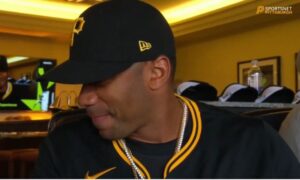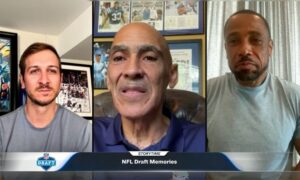By Alex Kozora
It was a chaotic overtime in the Stanley Cup Finals. Gregory Polanco was about to hit his first career home run, lifting the Pittsburgh Pirates to an extra-innings victory. Running the gamut of emotions. All that excitement came to a halt after the news of Chuck Noll’s death. The games didn’t matter to me anymore. The only thing I cared about was the legend lost.
This article, along with many other reactions, will be sentimental in nature. Ironic perhaps given Noll’s demeanor; a tactician whose calculated logic was rare for his era. But I’d like to think Noll would forgive us if we shed a tear or two. It’s difficult not to.
The Pittsburgh Steelers franchise is identified with the start of the 1970s, the dynasty Noll built. But tucked back in the minds of fans is the realization the organization began nearly 40 years earlier. Art Rooney purchased the franchise on July 8th, 1933. During that time, it toed the line between incompetence and indifference. In the 36 seasons before Noll walked the sidelines, the team appeared in only two playoff games, losing both, and had a record of 161-256-19, less than 39%. Noll’s career record: 209-156-1, 57%.
It was an eclectic group of coaches, each with their vices that were ultimately too much to overcome. Some, like Buddy Parker, too stubborn. Others, like Bill Austin, too focused on emulating previous greats.
Noll was Noll. There was a process, a blueprint to be followed, and as he famously put it, geography wasn’t the issue. Talent was. It was a slow process in the beginning, winning just 12 games in his first three years. But the group was being assembled.
It was led through Noll’s obsessive desire for the details. Undoubtedly a result of being a tiny offensive guard, even for the 50s. He was smart, savvy, forced to be in order to survive, and played under one of the NFL’s pioneers in advancing the game, Paul Brown. As author Gary Pomerantz wrote, Noll was called “The Pope” by his college coach because “he could do no wrong” on the field.
Noll was intelligent off the field too, attending law classes at night after practices during his time playing in the league. That was just who he was, and his quest for knowledge and willingness to pass it on was a hallmark of his unparalleled success.
Prior to his hiring, the previous 14 first round selections provided scarce results, if any. Six times the Steelers didn’t even have a selection. Those lack of picks may have actually served as a blessing. Because when they did draft, the selections ranged from players the team knew next to nothing about – Gary Glick – to Hall of Famers traded away before their potential realized – Len Dawson. In the 60’s before Noll, only one of the Steelers’ five first rounders spent more than two years with the club.
Under Noll, Bill Nunn, and the rest of the front office? 1969, the crown jewel. Joe Greene. The foil to The Emperor. Ferocious, out of control, once ripping an opposing high school’s bus doors open with his bare hands, but brimming with talent. Noll harnessed that and turned him into the franchise’s star. Terry Bradshaw, who like Noll didn’t have immediate success but became a valuable gunslinger and one of two quarterbacks to win four Super Bowls. Franco Harris in 1972 and Lynn Swann in 1974, the latter being part of one of the greatest draft classes in history. Even in later years, after the dynasty was just a memory, there was Louis Lipps in 1984 and Rod Woodson three seasons later. Combined, that’s five busts bronzed in Canton. In all, a whopping 11 Steelers who spent part or their entire career with Noll were elected into the Pro Football Hall of Fame.
After just six years, a franchise starved for success won its first Super Bowl. Pete Rozelle passed the Lombardi Trophy to The Chief, making the long wait well worth it. Mel Blount would say he had never seen Noll so in awe. Three more trophies would be added to the showcase by the end of the decade, making Noll the only coach in history to go 4-0 in the big game. Greene once said Noll wanted perfection. They achieved it.
Under him, the Steelers’ shed their label of the lovable losers. They were transformed into remarkable winners.
Noll handled the immense talent he had well. Jack Lambert called Noll the “ideal coach to play for.” Knowing Lambert, that is praise of the highest order. The players’ had a sauna in the locker room they would retreat to after games; their version of Mecca, a weekly visit to vent and discuss the game just played. Noll never went near there. There was that type of mutual respect between player and coach.
His coaching tree was impressive, too. Bud Carson created the Cover 2 in the 70s. Tony Dungy and Tom Moore got their first NFL coaching gigs working with Noll. The two would reunite years later to a win a championship with the Indianapolis Colts.
I know I’m under-qualified to speak to what Noll did. I was never alive to see him coach a single game, let alone the dynasty he built. But what I have gotten to see is the byproduct of his teachings. Not only did he plant the seeds to creating a winning culture, he became the catalyst that made them blossom. Draft well. Care about the details. Create an environment of stability. Be a man, one with integrity and professionalism. He built the foundation for the two Super Bowls I did get to witness.
As is the title of Pomerantz’s book, Noll consistently stressed doing “life’s work.” Living a life after and outside football. An important lesson and a testament to his goal of molding not just players but men. At the same time, it gave the city of Pittsburgh and its citizens, living life’s work, something to root for. Noll brought them along for the ride. And what a journey it was.
I’ve only watched one of the team’s four Super Bowl victories. I need to go back and find the other three. To watch Bradshaw throw to Swann and Stallworth. Harris and Bleier carry the rock, Webster paving the way. Greene, Greenwood, White, and Holmes dominate in the trenches. Lambert terrorize the middle. Blount and Shell patrol the secondary.
A team unlike any other.
Led by a coach unlike any other.







